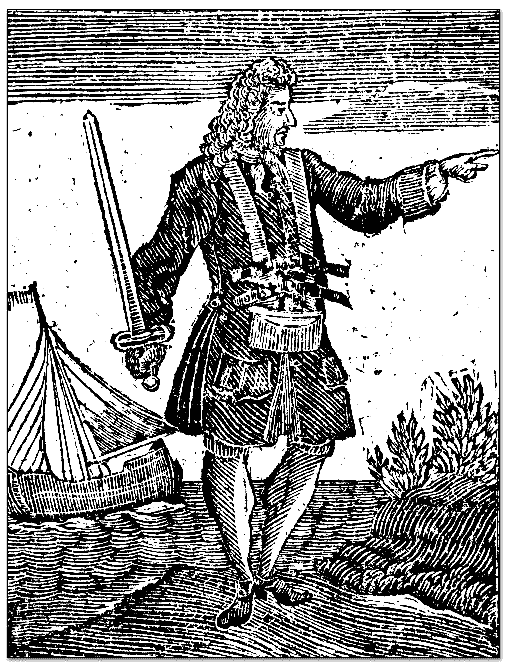Famous Pirate: Charles Vane
Brave, but unlucky pirate
Charles Vane was certainly one of the most skillful pirate captains. His navigating and ship combat skills were unmatchable, and he successfully plundered a numerous vessels. However, he often didn't get along with his crew, which completely ruined him and put the end to his career.
His pirating days began in 1716 when he became a crewmember under Henry Jennings. Jennings, like many other pirates, raided ships and camps of the sunken Spanish galleons' salvagers, on the coast of eastern Florida. In 1718, just before Jennings took pardon from the new governor of New Providence, Woodes Rogers, Vane became a captain and continued sailing on his own. Captain Vane became quickly infamous, because he captured many vessels, tortured and murdered many prisoners.
In fact he was one of the few brave pirates that did not accept the king's pardon. Whatsoever, when Rogers arrived in the region with the flagship the “Delicia” and two warships the “Rose” and “Milford”, Vane set on fire, his recently captured French prize vessel and set it to sail straight forward Rogers ' ships. While they were trying to avoid the ship in flames, Vane sailed away laughing. He even fired a few shots. That was a clear message that Vane will not accept the pardon. Provoked Rogers sent a former pirate, Captain Benjamin Hornigold to hunt him down. He caught many runaway pirates, but Vane evaded.
Between 1716 and 1721, pirate captain Charles Vane and his ship Range were infamous all across the West Indies
While he was sailing to the Carolinas, Vane captured a big warship. He used it as a second ship and promoted his quartermaster Yeates as the captain of that ship. Together, they easily plundered a lot of ships. Their biggest prize was the slave ship, brigantine from Africa with 90 black slaves.
As the pirates' attacks became a constant threat, the governor Spotswood of South Carolina hired many capable pirate hunters to capture the pesky pirates. One of them was famous colonel, William Rhett, who wanted to capture Vane personally. During his chase, Rhett encountered ship which had been plundered by Vane. The crew from robbed vessel said that pirates headed south. That was a deception. Vane's crew gave contrary statements to their prisoners. By going north, once again Vane evaded his pursuers. In the end, Colonel Rhett managed to save his reputation by capturing another wanted pirate, Stede Bonnet.
Captain Vane always treated his pirate companions with little respect. Although Yeates was second in command, he decided to leave Vane's command because of that treatment. One night, Yeates and his followers took one of the Vane's ships, with part of the plunder, all 90 slaves and fled from him.
Disappointed pirates continued to sail together and harass throughout Carolinas. Although they plundered a lot of ships in Carolinas, Captain Vane always evaded well-armed ships and crewmembers' dissatisfaction grew. In September 1718, he met his good friend Blackbeard. Together they celebrated their union by holding a week-long drunken party. Even traders and women from near Bathe Town joined them. After the long party which ended by the end of October, Vane headed towards New York, and there he robbed more vessels and decided to come back in Carolinas to sell goods.
Charles Vane's downfall began in March. While “operating" in Windward Passage between Cuba and Hispaniola, he and his crew attacked a vessel and expected little resistance. However, it was a powerful French Warship, and after a few shoots, Vane decided to flee from the battle. The day after, led by his quartermaster, Calico Jack Rackham, crew accused him of cowardice. Rackham took over lead of the ship, and Vane was left behind in a small captured sloop. A few loyal pirates joined him.
Skillful as he was, he quickly captured a couple of small ships and rebuilt his pirate fleet. However, while they were at the Bay of Honduras, Hurricane wrecked his ships. Almost entire crew drowned. Vane and another survivor somehow stranded on a small fisherman's island. They were waiting for any ship that would rescue them. Unfortunately, his “rescuer” was the former Buccaneer, Captain Holford, who knew Vane well. He imprisoned and extradited him to authorities in Port Royal. Vane was put on trial, found guilty and hanged on November 1720.
